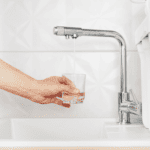Are you concerned about the sodium content in your drinking water? If you use a water softener, you may be wondering if this appliance is adding sodium to your tap water. This article will help you understand how water softeners work and if they do indeed add sodium to your drinking water.
What is a Water Softener?
A water softener is a device that removes hard water minerals from your tap water, such as calcium and magnesium. Hard water can cause a variety of problems in your home, from spotty dishes to clogged pipes. By removing these minerals, water softeners make your water easier on your skin, appliances, and plumbing.
How Does a Water Softener Work?
Water softeners work by exchanging hard water minerals with sodium ions. The process takes place in a resin tank, where hard water is passed through a bed of resin beads. These beads are coated with sodium ions, which attract and trap the hard water minerals. Over time, the sodium ions become saturated with the hard water minerals and must be regenerated. During the regeneration process, a brine solution is used to flush the hard water minerals out of the resin bed and replace them with fresh sodium ions.

Does a Water Softener Add Sodium to Drinking Water?
Yes, water softeners do add sodium to your drinking water. The amount of sodium added depends on the level of hard water minerals in your tap water and the size of the resin tank in your water softener. On average, a water softener will add about 20-40 milligrams of sodium per gallon of water. For comparison, a 8 oz glass of tomato juice contains about 200 milligrams of sodium.
Is Sodium in Drinking Water Harmful?
Sodium in drinking water is not harmful in small quantities. The recommended daily intake of sodium for adults is 2,300 milligrams, which is about the amount found in one teaspoon of salt. For those with high blood pressure or other health conditions, it may be necessary to limit their sodium intake. However, for most people, the amount of sodium added to drinking water by a water softener is not a significant concern.

What Impact Does a Water Softener Have on Fluoride?
Fluoride is a mineral that is added to drinking water in many communities to help prevent tooth decay. If your water contains fluoride and you use a water softener, it’s important to know that the process of exchanging hard water minerals with sodium ions can also reduce the amount of fluoride in your drinking water.
It’s important to note that the amount of fluoride removed by a water softener can vary depending on the type of resin used and the level of fluoride in your tap water. In some cases, fluoride removal may be significant and result in drinking water that is below the recommended levels for good dental health.
If you’re concerned about the impact a water softener may have on the fluoride content in your drinking water, you can talk to a water specialist or your local water treatment authority. They can help you determine if your water softener is affecting the fluoride levels and what you can do to ensure that you’re getting enough fluoride in your drinking water.
What Impact Does a Water Softener Have on Iron?
Iron is a naturally occurring mineral that can be found in groundwater. If your tap water contains high levels of iron, it can cause staining and discoloration of your plumbing fixtures, as well as give your water an unpleasant taste. A water softener can help remove excess iron from your drinking water.
During the process of exchanging hard water minerals with sodium ions, the resin bed in a water softener also attracts and removes iron from the water. This can result in improved water quality and a reduction in staining and discoloration caused by iron.
It’s important to note that the amount of iron removed by a water softener can vary depending on the level of iron in your tap water and the type of resin used. In some cases, a water softener may not be effective in removing high levels of iron and a separate iron filtration system may be necessary.
If you’re concerned about the impact a water softener may have on the iron content in your drinking water, you can talk to a water specialist or your local water treatment authority. They can help you determine if your water softener is affecting the iron levels and what you can do to ensure that you’re getting clean, iron-free water.
Conclusion
In conclusion, water softeners do add sodium to drinking water, but the amount added is usually not harmful to most people. If you have concerns about the sodium content in your drinking water, you can talk to your doctor or a water specialist. They can help you determine if a water softener is right for you and what alternatives are available. Whether you choose to use a water softener or not, it’s important to remember that the health benefits of having clean, soft water far outweigh any potential negative effects.
Frequently Asked Questions
Q. How much sodium does a water softener add to drinking water?
A. A water softener typically adds 20-40 milligrams of sodium per gallon of water.
Q. Is the amount of sodium added by a water softener harmful to health?
A. For most people, the amount of sodium added by a water softener is not harmful. However, individuals with high blood pressure or other health conditions may need to limit their sodium intake.
Q. Is there a way to reduce the amount of sodium added by a water softener?
A. Yes, you can reduce the amount of sodium added by a water softener by choosing a system with a larger resin tank or by regenerating the resin bed less frequently.
Q. Are there alternatives to a water softener that don’t add sodium to drinking water?
A. Yes, there are alternative systems such as reverse osmosis or ion exchange that can remove hard water minerals without adding sodium.
Q. Can I still drink the water after it’s been through a water softener?
A. Yes, water that has been through a water softener is safe to drink. However, if you have concerns about the sodium content, you can talk to a water specialist or your doctor.









